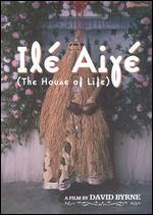ILÉ AIYÉ — PRESS/REVIEWS |
| Byrne's movie isn’t much of an explication, though; it's more a series of audiovisual postcards, emphasizing the exoticism and otherness of Candomblé. There seems to be a dense symbolic structure at work here, but Byrne provides us only with the occasional and usually impenetrable title card—e.g., "The Earth Health and Sickness." — Jon Danziger, digitallyobsessed.com |
| With the earthy, yet otherworldly Ilé Aiyé (The House
of Life), David Byrne (True Stories) explores the spirit cult of
Candomblé. Based in the Bahia region of Brazil, the African-originated
religion permeates all aspects of the culture. Byrne incorporates
music, dance, interviews, and clips from old black-and-white Brazilian
movies into his documentary. Narration is kept to a minimum and
the visuals do most of the talking--along with the rhythmic, trance-inducing
songs, accompanied by translations of their evocative lyrics. As
befits a former art student—and Talking Head—Byrne does get a
little "arty" at times, as when he places screens within
screens (much like Peter Greenaway's Pillow Book). Fortunately,
the effect isn't as distracting as it sounds and is only used sporadically.
Ilé Aiyé is a must for fans of Byrne's groundbreaking
Brazil Classics, Vol. 1 compilation, on which Tropicalia legend
Caetano Veloso sings the lovely number of the same name. — Kathleen C. Fennessy, Amazon.com |
| "What
Mr. Byrne has done is to create an impressionistic portrait of this
Candomblé culture. His distinctly personal vision offers none
of the traditional documentary standbys. ...With Ilé
Aiyé,
David Byrne has done justice to a wonderful culture. He's thrown
such a fine party, there's no telling who might show up." —Robert Goldberg, The Wall Street Journal |




